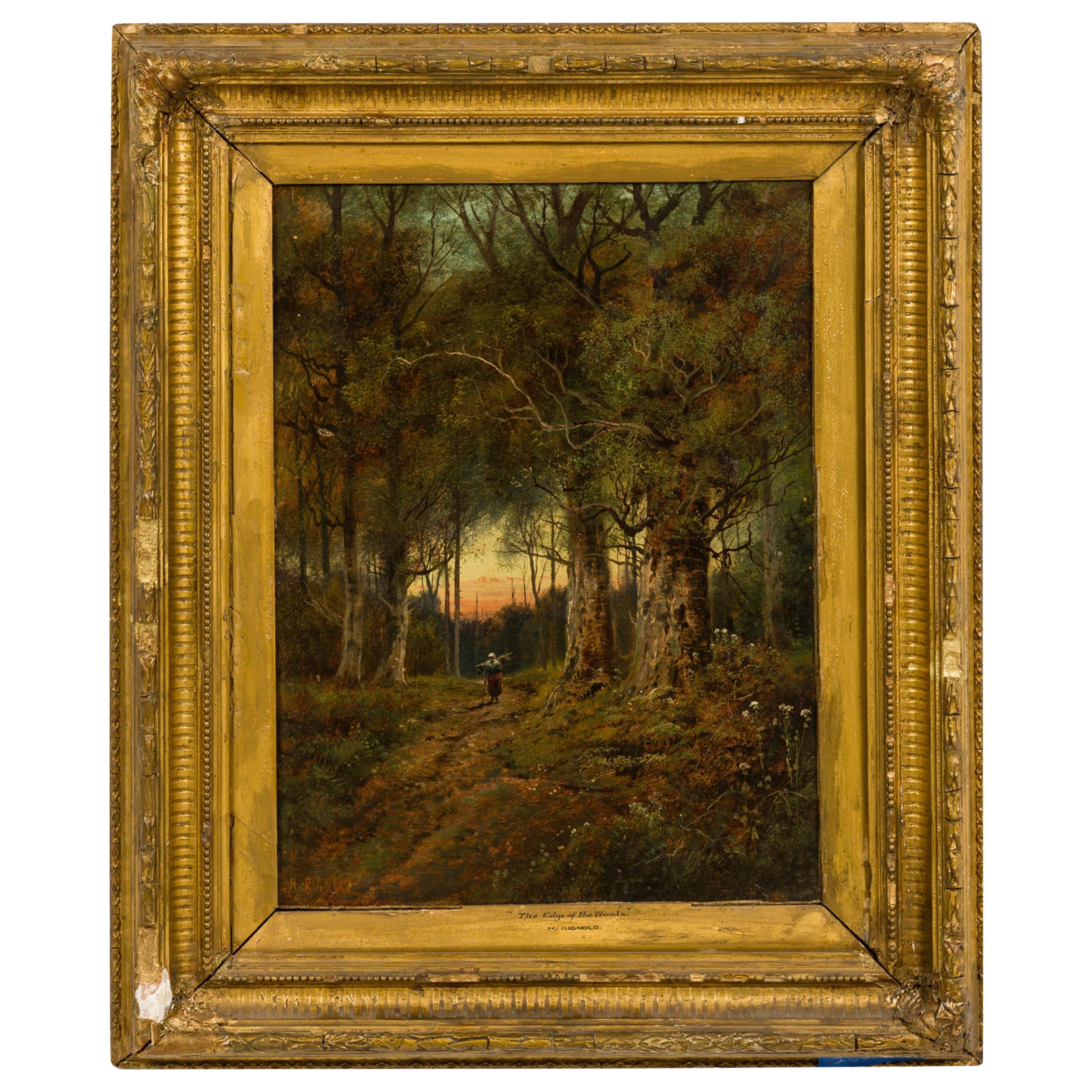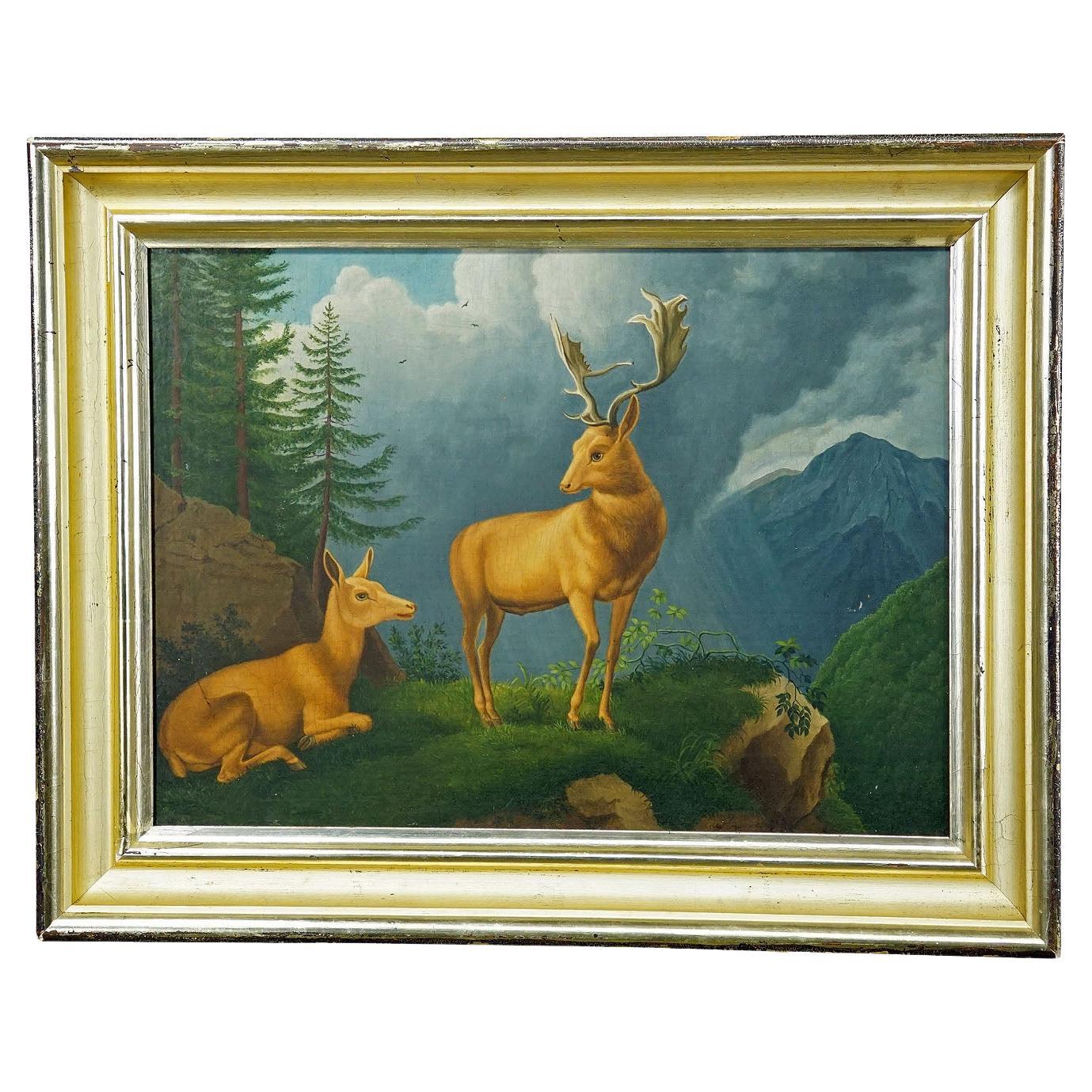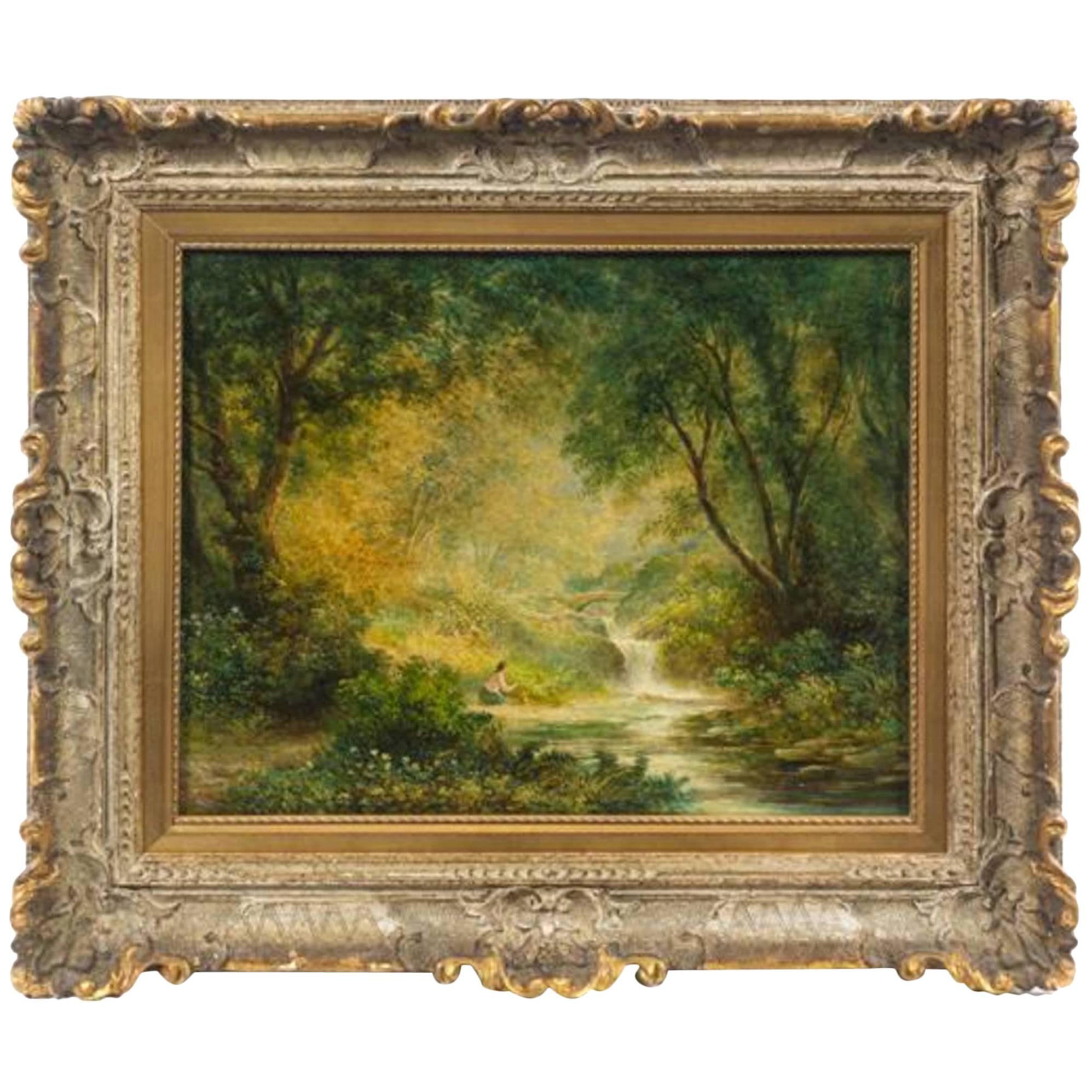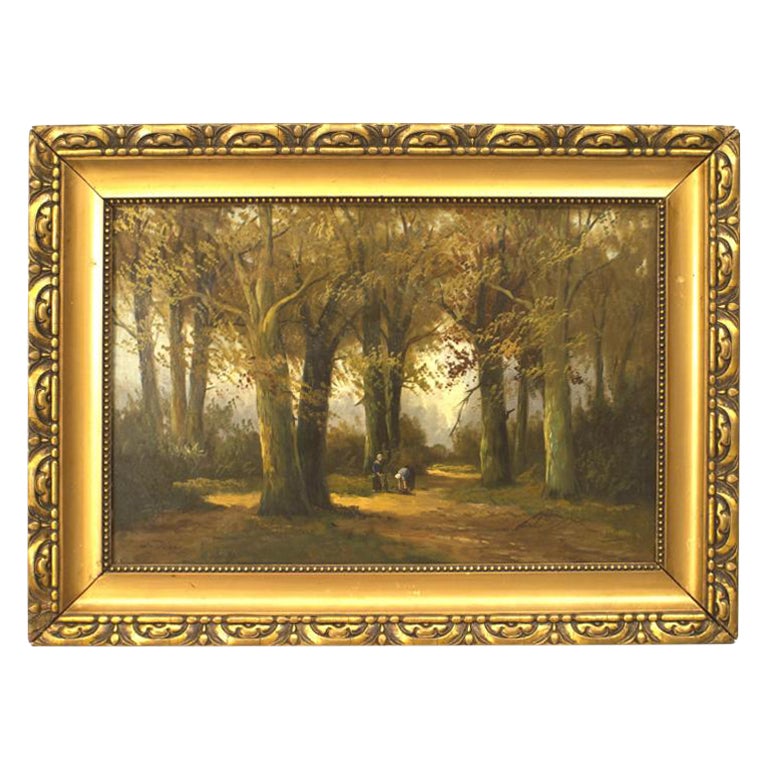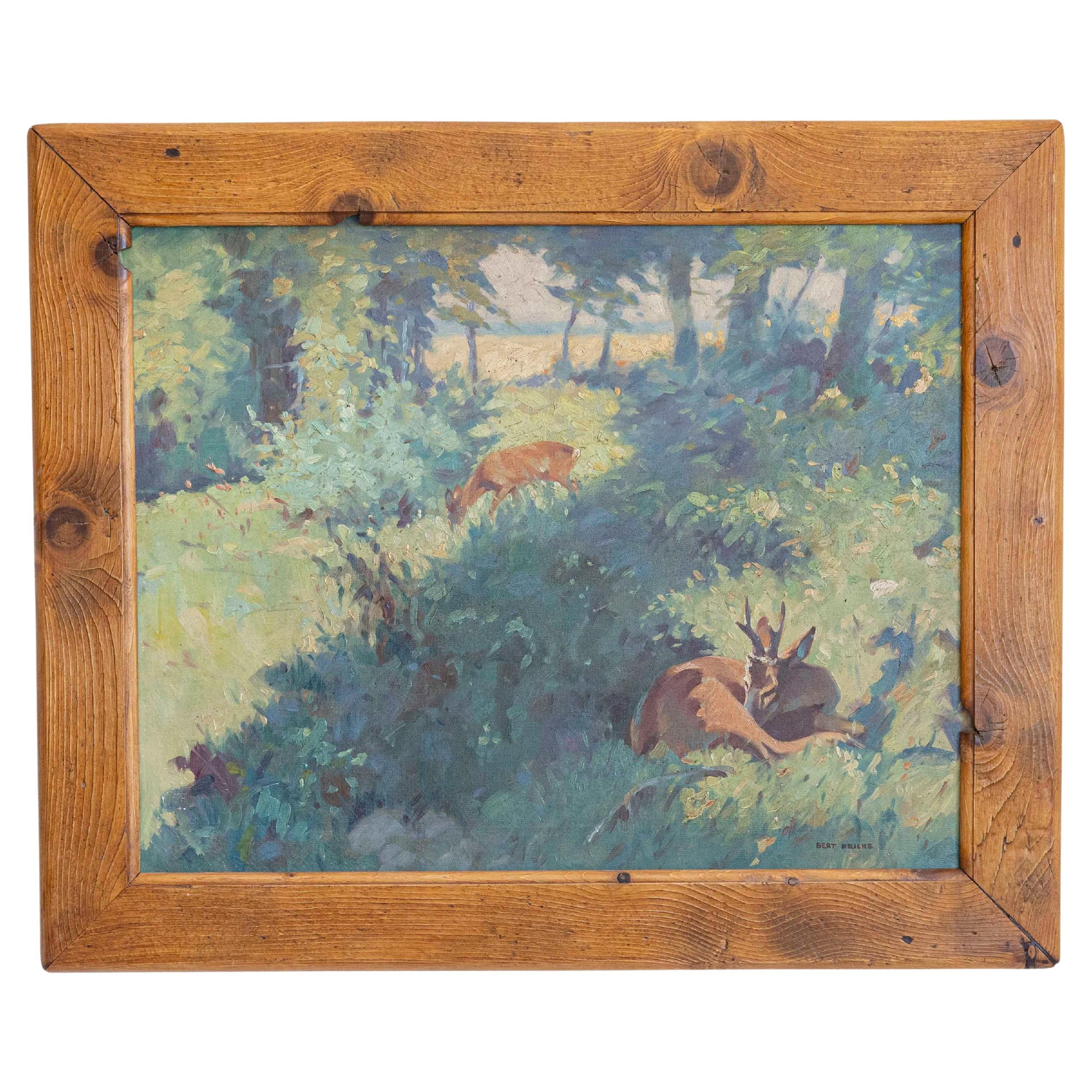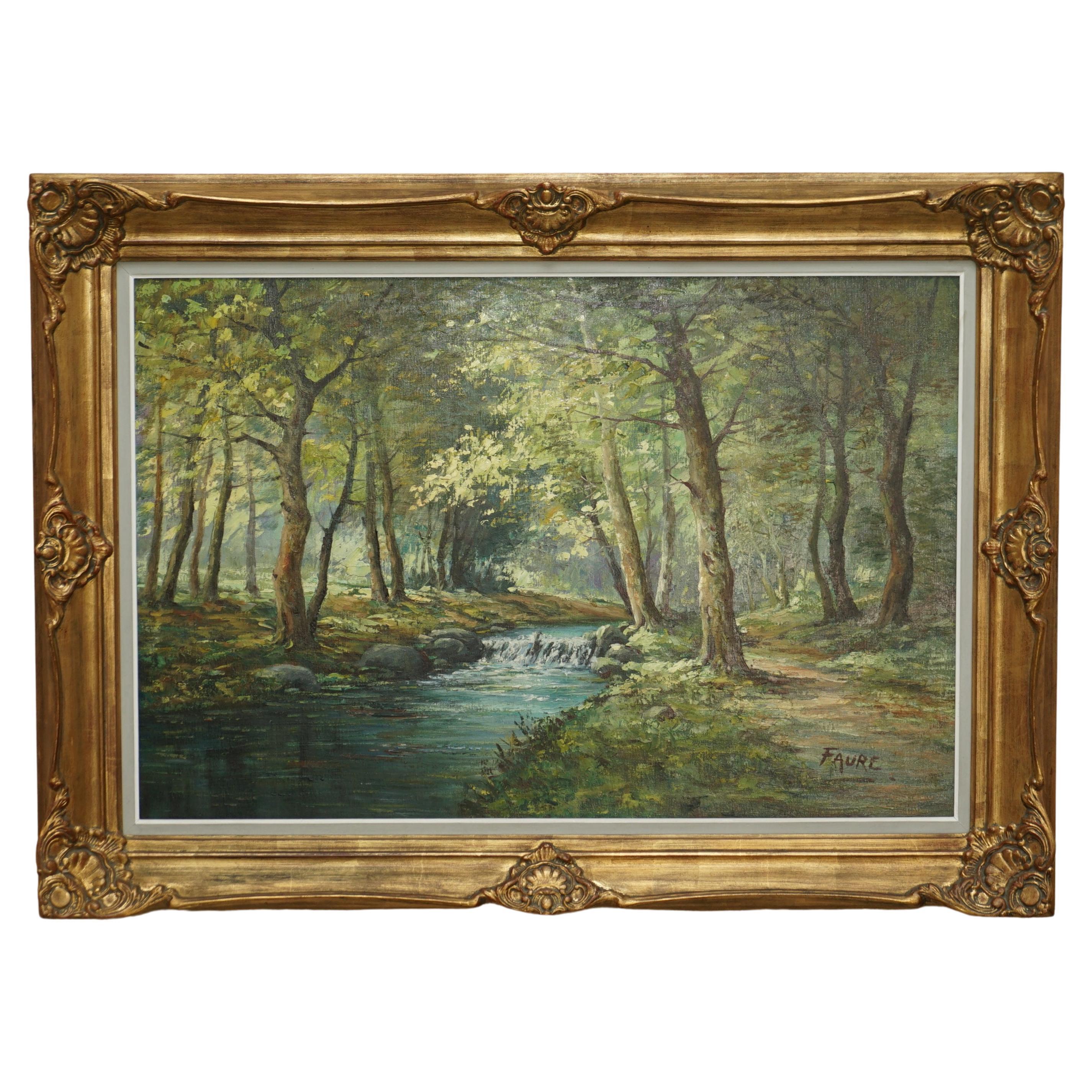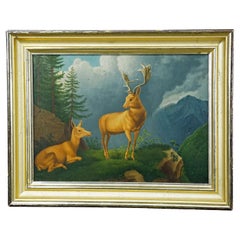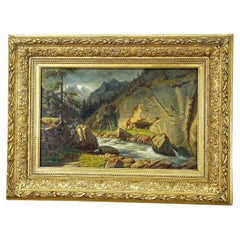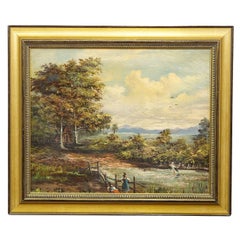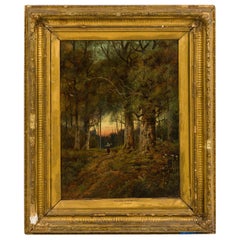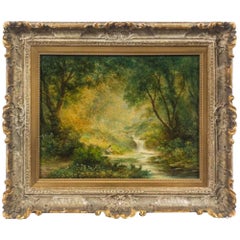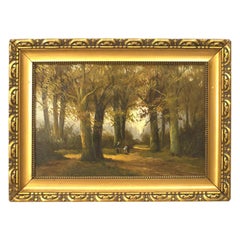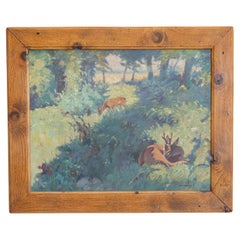Items Similar to Ludwig Sellmayr, Deer with Doe and Fawn in the Forest, ca. 1880
Want more images or videos?
Request additional images or videos from the seller
1 of 7
Ludwig Sellmayr, Deer with Doe and Fawn in the Forest, ca. 1880
$3,260
£2,452.30
€2,840.88
CA$4,595.93
A$5,110.98
CHF 2,682.08
MX$62,325.89
NOK 33,902.48
SEK 31,784.92
DKK 21,203.97
About the Item
Ludwig Sellmayr, Deer with Doe and Fawn in the Forest, ca. 1880
A naturalistic oil painting depicting a deer family in the forest. Oil on canvas by Ludwig Sellmayr (Munich 1834 - 1901). Framed with antique richly decorated and gilded frame. Signed on the lower left.
Measures:
Width: 32.28" (82cm)
Height: 22.83" (58cm)
Depth: 2.76" (7cm)
Inside width: 24.02" (61cm), inside height: 14.76" (37.5cm)
The Biedermeier period runs parallel to the Romantic period and both are characterized by similar features. Domesticity, closeness to nature, folksiness and need for harmony are buzzwords of this time. The focus is on the simple, the conservative and the tried and tested. There is little experimentation and more observation and enjoyment. The art style is kept very realistic and shows great similarity to photography. Domestic idyllic representations, beautiful landscape and impressive portraits are the most popular topics for oil paintings until the end of the 19th century.
artfour is an owner-managed trading company that sells Black Forest wood carvings, antler furniture and an impressive variety of unique decorative items. Our antiques are on display in a century-old barn in southern Germany, which we renovated ourselves. Antiques have been our passion since the 1980s. We ship worldwide, perfectly packaged and with a money back guarantee. This allows us to be your preferred partner for the Black Forest and ancient art.
- Dimensions:Height: 22.84 in (58 cm)Width: 32.29 in (82 cm)Depth: 2.76 in (7 cm)
- Style:Early Victorian (In the Style Of)
- Materials and Techniques:
- Place of Origin:
- Period:
- Date of Manufacture:circa 1880
- Condition:Wear consistent with age and use. All of our items are in very good condition. They have been utilised and therefore may show age-related traces of usage. If not mentioned in the item description they don't have defects. Feel free to contact us for a detailled condition report.
- Seller Location:Berghuelen, DE
- Reference Number:Seller: e57531stDibs: LU988724020142
About the Seller
5.0
Platinum Seller
Premium sellers with a 4.7+ rating and 24-hour response times
Established in 1989
1stDibs seller since 2013
649 sales on 1stDibs
Typical response time: 2 hours
- ShippingRetrieving quote...Shipping from: Berghuelen, Germany
- Return Policy
Authenticity Guarantee
In the unlikely event there’s an issue with an item’s authenticity, contact us within 1 year for a full refund. DetailsMoney-Back Guarantee
If your item is not as described, is damaged in transit, or does not arrive, contact us within 7 days for a full refund. Details24-Hour Cancellation
You have a 24-hour grace period in which to reconsider your purchase, with no questions asked.Vetted Professional Sellers
Our world-class sellers must adhere to strict standards for service and quality, maintaining the integrity of our listings.Price-Match Guarantee
If you find that a seller listed the same item for a lower price elsewhere, we’ll match it.Trusted Global Delivery
Our best-in-class carrier network provides specialized shipping options worldwide, including custom delivery.More From This Seller
View AllUnknown - Painting Fallow Deer with Doe in the Alps, Oil on Canvas 19th century
Located in Berghuelen, DE
Unknown - Painting Fallow Deer with Doe in the Alps, Oil on Canvas 19th century
A lovely Biedermeier style oil painting depicting a fallow deer family in the alpine landscape. Oil on canvas 1st halve of the 19th century. Framed with antique gilded frame, stretcher frame replaced. A marvelous wall decoration for each rustig log cabin.
The Biedermeier period runs parallel to the Romantic period and both are characterized by similar features. Domesticity, closeness to nature, folksiness and need for harmony are buzzwords of this time. The focus is on the simple, the conservative and the tried and tested. There is little experimentation and more observation and enjoyment. The art style is kept very realistic and shows great similarity to photography. Domestic idyllic representations, beautiful landscape and impressive portraits are the most popular topics for oil paintings...
Category
Antique Mid-19th Century German Early Victorian Paintings
Materials
Wood
Carl Euler - Bear Hunt in the Zillerthaler Alps, Oil Painting on Board 1889
Located in Berghuelen, DE
Carl Euler - Bear Hunt in the Zillerthaler Alps, Oil Painting on Wooden Board 1889
An impressive oil painting depicting a high mountain landscape with mount...
Category
Antique Late 19th Century German Early Victorian Paintings
Materials
Wood
19th Century Biedermeier Landscape Painting with Lake and Trees
Located in Berghuelen, DE
19th Century Biedermeier Landscape Painting with Lake and Trees
An antique landscape painting in a golden frame depicting a peaceful rural setting with large trees, a small hut, a l...
Category
Antique 1880s German Biedermeier Paintings
Materials
Canvas, Wood, Paint
Shepherd with Herd in a Victorian Landscape, Oil on Wood, 19th Century
Located in Berghuelen, DE
Shepherd with Herd in a Victorian Landscape, Oil on Wood 19th century
An original antique oil painting showing a shepherd with his sheeps and cows resting on a pond. Painted in oi...
Category
Antique Late 19th Century German Biedermeier Paintings
Materials
Wood
Summerly Mountain Landscape with Hiker on Hiking Trail, 19th Century
Located in Berghuelen, DE
Summerly Mountain Landscape with Hiker on Hiking Trail, 19th century.
An antique oil painting depicting a hiker on an alpine hiking trail and a bridge over a mountrain stream. Painted on canvas with pastell colors. Framed with antique decorative gilded frame. Painted in the area of Tyrol or South Germany, late 19th century. A high quality antique oil painting which will highlight your alpine cabin wall decoration. Frame with minor defects.
The Biedermeier period runs parallel to the Romantic period and both are characterized by similar features. Domesticity, closeness to nature, folksiness and need for harmony are buzzwords of this time. The focus is on the simple, the conservative and the tried and tested. There is little experimentation and more observation and enjoyment. The art style is kept very realistic and shows great similarity to photography. Domestic idyllic representations, beautiful landscape and impressive portraits are the most popular topics for oil paintings...
Category
Antique Late 19th Century German Biedermeier Paintings
Materials
Canvas, Wood
Summerly Mountain Landscape with Water Fall and Mountain Hut, 19th Century
Located in Berghuelen, DE
Summerly Mountain Landscape with Water Fall and Mountain Hut, 19th century
An antique oil painting depicting a mountain landscape with waterfall in front of a mountain shelter. Painted on canvas with pastell colors. Framed with antique decorative gilded frame. On the left base signed by the artist "Kuchl". Painted in the area of Tyrol or South Germany, late 19th century. A high quality antique oil painting which will highlight your alpine cabin wall decoration.
The Biedermeier period runs parallel to the Romantic period and both are characterized by similar features. Domesticity, closeness to nature, folksiness and need for harmony are buzzwords of this time. The focus is on the simple, the conservative and the tried and tested. There is little experimentation and more observation and enjoyment. The art style is kept very realistic and shows great similarity to photography. Domestic idyllic representations, beautiful landscape and impressive portraits are the most popular topics for oil paintings...
Category
Antique Late 19th Century German Early Victorian Paintings
Materials
Wood, Canvas
You May Also Like
English Victorian Landscape of Lady in Forest
Located in Queens, NY
English Victorian gilt framed oil painting of lady in vertical forest landscape with sticks on back (H. Reynold)
Category
Antique Late 19th Century British Victorian Paintings
Materials
Paint
Continental School 'Late 19th century' Forest Landscape with Figure
Located in Buchanan, MI
Continental school
(Late 19th century)
Forest landscape with figure
Oil on canvas
Dimensions: 15 3/4 x 19 3/4 inches.
Category
Antique 19th Century Paintings
Materials
Canvas, Giltwood
English Victorian Landscape of Forest Scene
Located in Queens, NY
English Victorian gilt framed landscape oil painting of forest scene with 2 figures.
Category
Antique Late 19th Century British Victorian Paintings
Materials
Paint
Deer in the Woods, Bert Fricke Wolfenbuttel Oil on Panel Painting circa 1920
Located in Atlanta, GA
A German oil on panel painting by Bert Fricke Wolfenbuttel titled 'Deer in the Woods' from the early 20th century, in natural wooden frame. Created in Germany during the first quarte...
Category
Early 20th Century German Paintings
Materials
Wood, Paint
Antique Flemish Oil Painting Signed Faure Van Overbroek circa 1880 Rural Scene
Located in West Sussex, Pulborough
We are delighted to offer for sale this very large stunning original late 19th century Flemish oil painting, stamped to the rear Jean...
Category
Antique 1880s Danish Victorian Paintings
Materials
Canvas
Frederick Golden Short New Forest Woodland Signed and Dated 1920 Oil Painting
Located in West Sussex, Pulborough
We are delighted to offer this stunning Frederick Golden Short 1863 – 1936 oil painting which dated 1920 and signed of the new Forest Woodland
This piece is exceptionally well exe...
Category
Vintage 1920s English Art Deco Paintings
Materials
Canvas
$3,388 Sale Price
30% Off
